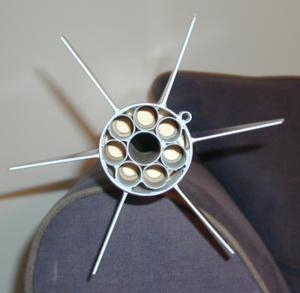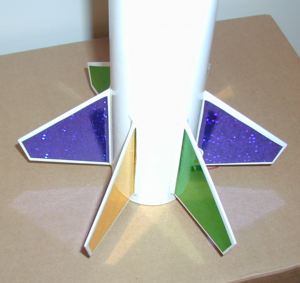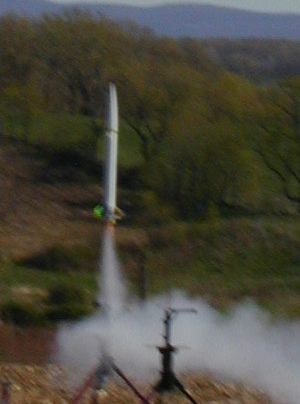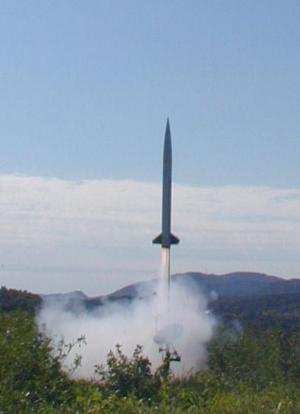| Manufacturer: | Phoenix Rocketry |
![[Picture]](/images/archive/images/ratings/rating_phoenix_mighty_kat.gif) (10/01/02) Phoenix Rocketry is the new company from the former owner/partner
of North Coast Rocketry. Some may remember North Coast Rocketry before they
were known as Estes North Coast Rocket. Well, now it is Phoenix Rocketry and in
a thread on RMR, Matt Steele, President of North Coast Rocketry, said:
"NCR was never formally purchased by Estes and exists to this day as a
separate legal company. The Estes/NCR agreement was terminated in late 1998
when I left employment at Estes." Matt also said of his new kits under
the Phoenix name: "Many of these kits are similar to old NCR kits.
However, the added experience of working in the hobby industry over the years
has allowed me to make improvements in the kits over what was originally sold
by NCR. These will be similar to the old NCR philosophy in that they will be
designs that are more than "3 fins and a nose cone" and will be for
advanced rocketeers. The first kit released, the Mighty Kat, is an eight engine
cluster model; the second, the BH-2000, has strap on motor tubes that would
allow you to modify the design for clusters if you wish. An 2.6" diameter
Army Corporal kit will be available next week. There are plans on releasing up
to more kits by the end of the year, depending on the response to these
kits." To date (3/02), these are still the only offerings on Discount
Rocketry.
(10/01/02) Phoenix Rocketry is the new company from the former owner/partner
of North Coast Rocketry. Some may remember North Coast Rocketry before they
were known as Estes North Coast Rocket. Well, now it is Phoenix Rocketry and in
a thread on RMR, Matt Steele, President of North Coast Rocketry, said:
"NCR was never formally purchased by Estes and exists to this day as a
separate legal company. The Estes/NCR agreement was terminated in late 1998
when I left employment at Estes." Matt also said of his new kits under
the Phoenix name: "Many of these kits are similar to old NCR kits.
However, the added experience of working in the hobby industry over the years
has allowed me to make improvements in the kits over what was originally sold
by NCR. These will be similar to the old NCR philosophy in that they will be
designs that are more than "3 fins and a nose cone" and will be for
advanced rocketeers. The first kit released, the Mighty Kat, is an eight engine
cluster model; the second, the BH-2000, has strap on motor tubes that would
allow you to modify the design for clusters if you wish. An 2.6" diameter
Army Corporal kit will be available next week. There are plans on releasing up
to more kits by the end of the year, depending on the response to these
kits." To date (3/02), these are still the only offerings on Discount
Rocketry.
 As
I'm always looking to try out various manufacturer's kits, I came across
Phoenix Rocketry while surfing at Discount Rocketry. I picked up their Mighty
Kat because it is an up to 8 motor cluster rocket. A central 24mm and up to
seven (7) 18mm motors. It also had some extra eye-appear with its six fin
configuration.
As
I'm always looking to try out various manufacturer's kits, I came across
Phoenix Rocketry while surfing at Discount Rocketry. I picked up their Mighty
Kat because it is an up to 8 motor cluster rocket. A central 24mm and up to
seven (7) 18mm motors. It also had some extra eye-appear with its six fin
configuration.
The rocket is 37" tall and has a 2.56" diameter. It is made up of a single body tube that is 24" long. There is a 13" plastic nose cone to make up the entire length. There are six (6) fins made from 1/32" Laser Cut plywood. Two centering rings and the various motor tubes and thrust rings. The recovery system includes a 1/32" diameter steel shock tether (21" long) and a 1/2" wide flat elastic shock cord (60" long). The are two (2) 1/4" launch lugs provided as well. There is no parachute provided which is fine with me as I building up quite a collection of them. There are no decals.
CONSTRUCTION:
The instructions are on 5 pages of 8.5 x 11" paper. The parts list includes illustrations and there is a single page with the Fin Marking Guide and an illustration of the motor cluster. The remainder of the instructions are text and cover the assembly, preparation for flight and flying instructions. They also include where the Center of Gravity is supposed to be once finished.
Before I get started on the actual construction I must point out that I have identified quality control issues with this rocket. From the get-go, the front page says the rocket is 27.25" long and it is actually 37". From there the kit had the following parts issues: 1) missing the 24mm thrust ring, 2) only had five (5) of the seven (7) 18mm thrust rings, 3) provided four (4) Loop/Sleeve Connectors instead of only the two (2) that were needed, and 4) provided 70" of shock cord verses the 60" designated. Now, items number 3 and 4 are not a big deal but do show a quality control issue. I did not try to have any of these items corrected with Discount Rocketry or Phoenix Rocketry. I simply grabbed some thrust rings for the 18mm motor tubes and went for it.
The first assembly step is trimming, sanding and sealing the fins. Then you move on to check the fit of the centering rings inside the body tube. The instructions say to sand for fit, however, mine fit inside extremely easily. I didn't imagine this to be a problem, but after completion of the motor cluster and installation into the body tube I realized that having them too loose was probably a bad thing.
The motor mount is assembled by sliding the 6" 24mm motor tube into the centering rings (which fit perfectly). The upper centering ring is glued 1/2" from the top and the lower ring is glued leaving 2 3/4" of it sticking out.
The 18mm motor tubes are 2 3/4" long. The instructions say to make a 1/4" diameter vent hole in the top and then to glue the thrust ring into the motor tube to a depth of 2 1/2". Well, the width of the 18mm thrust rings were about 1/8" so that reduced the size of the vent hole. I felt it was important to still have a good vent so I went ahead and cut the hole right to and through the top of each motor tube. Another handy tool would be to have an insert tube for ensuring each 18mm thrust ring is at 2.5". I used a tube from an old Estes kit.
 Next, these seven (7) 18mm motor tubes are glued to the 24mm motor
tube and set to touch the lower centering ring. You are instructed to glue the
tube in place with the vent hole facing outward. My concern was that once in
place inside the body tube that the wall of the body tube would effectively
block the vent. I did this based on the math. So I rotated mine by about 45
degrees to ensure that the vent would be in the gap between two 18mm tubes and
the inside wall of the body tube.
Next, these seven (7) 18mm motor tubes are glued to the 24mm motor
tube and set to touch the lower centering ring. You are instructed to glue the
tube in place with the vent hole facing outward. My concern was that once in
place inside the body tube that the wall of the body tube would effectively
block the vent. I did this based on the math. So I rotated mine by about 45
degrees to ensure that the vent would be in the gap between two 18mm tubes and
the inside wall of the body tube.
The steel cable is attached to the upper centering ring. You drill two 1/16" holes and thread it through. Then it is looped with a sleeve and you crimp it with pliers or a crimper. The opposite end is also looped and crimped. Here in step 8 it says to adjust it until the assembly is "TBD" long. I'm sure they were looking to have it so that it did not extend out the top of the body tube. Mine did not after attaching the centering ring and then using a 1" loop at the top. The elastic shock cord is tied to this upper loop to complete the shock tether/cord assembly.
After this the motor mount is installed into the body tube.
The next step is attaching the fins. They are surface mount, however, Phoenix recommends sanding off the glassine coating where they will attach and to also use a T-pin to create a row of holes on each side of the fin line. These holes allow the glue to flow into them and creates little glue rivets. This is a good technique that I have used on other kits. I have some times substituted the T-pin with my hobby knife and actually created small 1/16 - 1/8" slits. I wiggle the hobby knife to open it up just a bit too. I have found that this allows the glue to flow into the slots better (than it would the pin holes).
After the fins, the launch lugs are attached, the nose cone is added and then you select your own parachute. Phoenix recommends a 24" to 36" rip-stop nylon 'chute, which based on the finished weight is about right. The 24" would quite a fast drop so I'm looking at a 30" 'chute.
Phoenix says that the rocket should weight 12 ounces. My naked rocket came in at 10.6 ounces. They also say the Center of Gravity should be 13.25" from the aft-end of the rocket. My naked rocket came in at 13.9" so I'm in good shape. I'll re-check these after finishing and update my RockSim file accordingly.
 I
used my standard methods for finishing
Kraft paper tubes and also for finishing
plastic nose cones. I painted the whole rocket gloss white with Walmart
paint (additional
comments about Walmart paint). I then used some contact paper that I bought
from Staples to decorate the fins. I like it and may use this on more rockets.
Just be careful clear-coating afterward as this contact paper is slick and just
a little paint will run.
I
used my standard methods for finishing
Kraft paper tubes and also for finishing
plastic nose cones. I painted the whole rocket gloss white with Walmart
paint (additional
comments about Walmart paint). I then used some contact paper that I bought
from Staples to decorate the fins. I like it and may use this on more rockets.
Just be careful clear-coating afterward as this contact paper is slick and just
a little paint will run.
My finished weighed 12.5 ounces which was right on their target.
Overall, for CONSTRUCTION I would rate this kit 2 points. As you have just read, there are numerous instruction and kit quality issues. I'm sure (I hope) that some of this was "first release" issues, but I don't know. Outside of those items identified, the kit has quality materials and some good instructional techniques. Motor retention is another issue of mine and there are no decals at all. I do consider it a win to not provide the parachute in my case, but maybe it should be optional.
 FLIGHT/RECOVERY:
FLIGHT/RECOVERY:
Phoenix had the following motor recommendations:
Single Motor Flights: D12-3, E15-4, E30-4, F32-10, F44-10, F72-10 or reloadables, E18-4, E28-5, F24-7, F39-6.
Cluster Motor Flights: Core: D12-5, E15-7, E30-7 with 2, 4, 6, or 7 each A8, B4, B6, C6 (any delay)
I used RockSim to give a helping hand. RockSim was really useful for this cluster rocket. I decided the first flight should be on a (7) C6-3's and a central C11-7. This would give me an altitude of about 1300 feet and the delay seemed to be right. Note: that the outer 18mm motors eject out the rear of the rocket.
I got to my first launch ever in Pine Plains, NY to fly with CTRA-NARCO. The Mighty Kat was my first attempt (see pic on right). I loaded the motors and installed hand-dipped ignitors that I had ohm'd out so that they all matched to within 0.1 ohm. Upon ignition only (2) of the C6's lit. It lifted the rocket just high enough to clear the rod, then it dove down into the ground. It broke (slightly) two fins. I repaired those easily.
My next attempt was worse. Using my own controller (14.2 volt) and different hand dipped ignitors, I was only able to get one motor to light and it didn't even leave the pad.
 Very frustrated with this bird, I decided I would try all Estes
ignitors and if that didn't work I was going to attempt my first "flash
pan". I installed the Estes ignitors and used the plugs to hold them in.
While in, I twisted (carefully) wire extensions onto the ignitors. I then
twisted the extensions together to make my two leads. I attempted this launch
using my controller and upon pressing the launch button they ignited. Yes, and
they all appeared to ignite as the rocket lifted from the pad (see pic on
right).
Very frustrated with this bird, I decided I would try all Estes
ignitors and if that didn't work I was going to attempt my first "flash
pan". I installed the Estes ignitors and used the plugs to hold them in.
While in, I twisted (carefully) wire extensions onto the ignitors. I then
twisted the extensions together to make my two leads. I attempted this launch
using my controller and upon pressing the launch button they ignited. Yes, and
they all appeared to ignite as the rocket lifted from the pad (see pic on
right).
The rocket flew quite straight and to every bit of a 1000 feet. It arced over and ejection occurred. The parachute got stuck in the body tube so it fell fast with the nose cone swinging behind the rocket body. I'm actually glad for this mishap so I didn't have too long of a walk. We recovered it with no damage.
For FLIGHT/RECOVERY, I would rate this kit 3 ½ points. My tendency is to rate it even lower. Why? Well, to get this one in the air it took 3 attempts. So I can hear some of you now, "well, if you knew how to light clusters this wouldn't have been the case". Maybe so, but I used reasonable techniques that had worked in the past. If anything this is a rocket for a person very experienced with clusters; (8) eight motors! It flew straight and it even looked good once all the motors were lit.
I give the kit an OVERALL rating of 3 points. There were many issues with the build of the rocket even before the challenge of getting all the motors to light. Now, setting all that aside, if you are looking for a real challenging flier and one that has fairly nice looks, then the Mighty Kat could be a good choice. You have to be willing to spend a little to get it into the air though. (7) seven C6-7's and a single C11-7 will cost you about $15.00 for a single flight. All this for about the equivalent of an "F" motor. Can you say EconoJets?
Sponsored Ads
 |
 |











